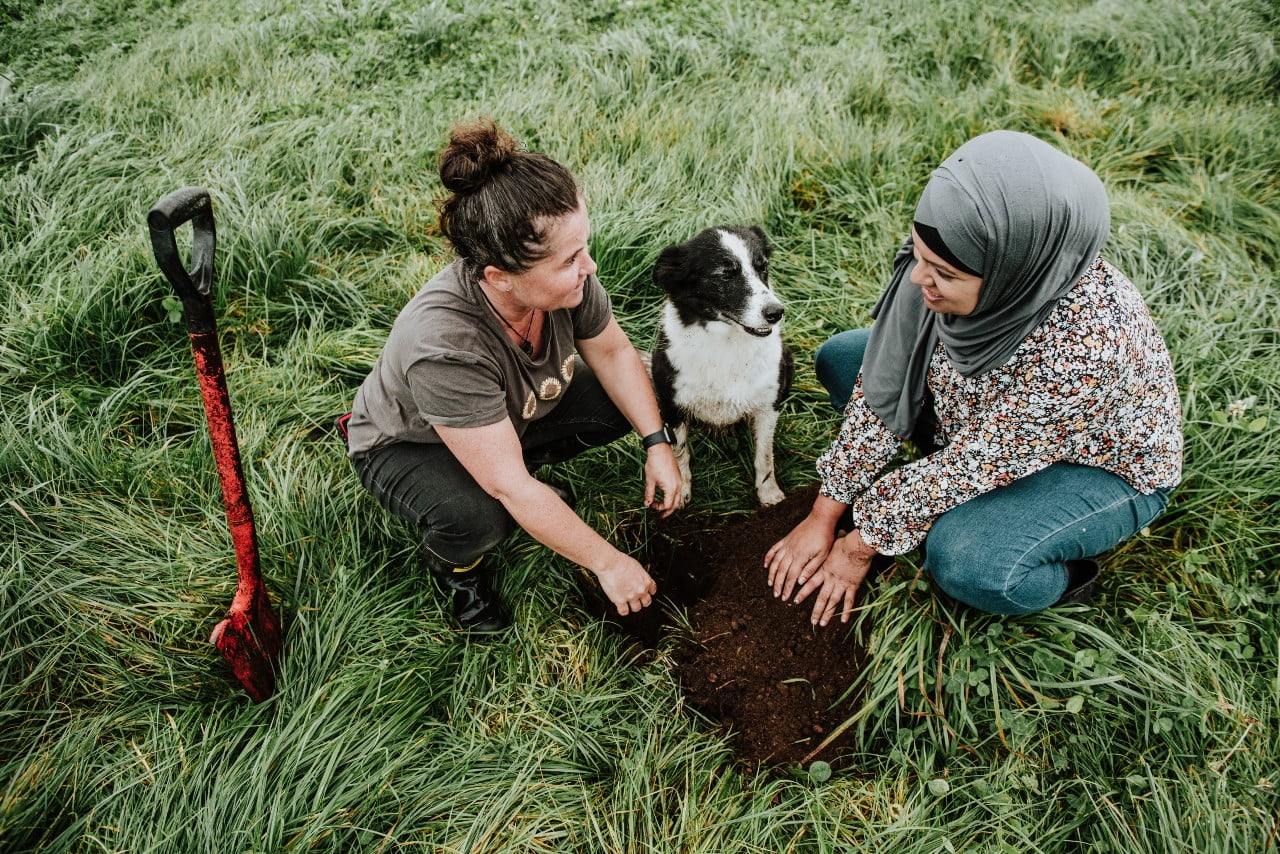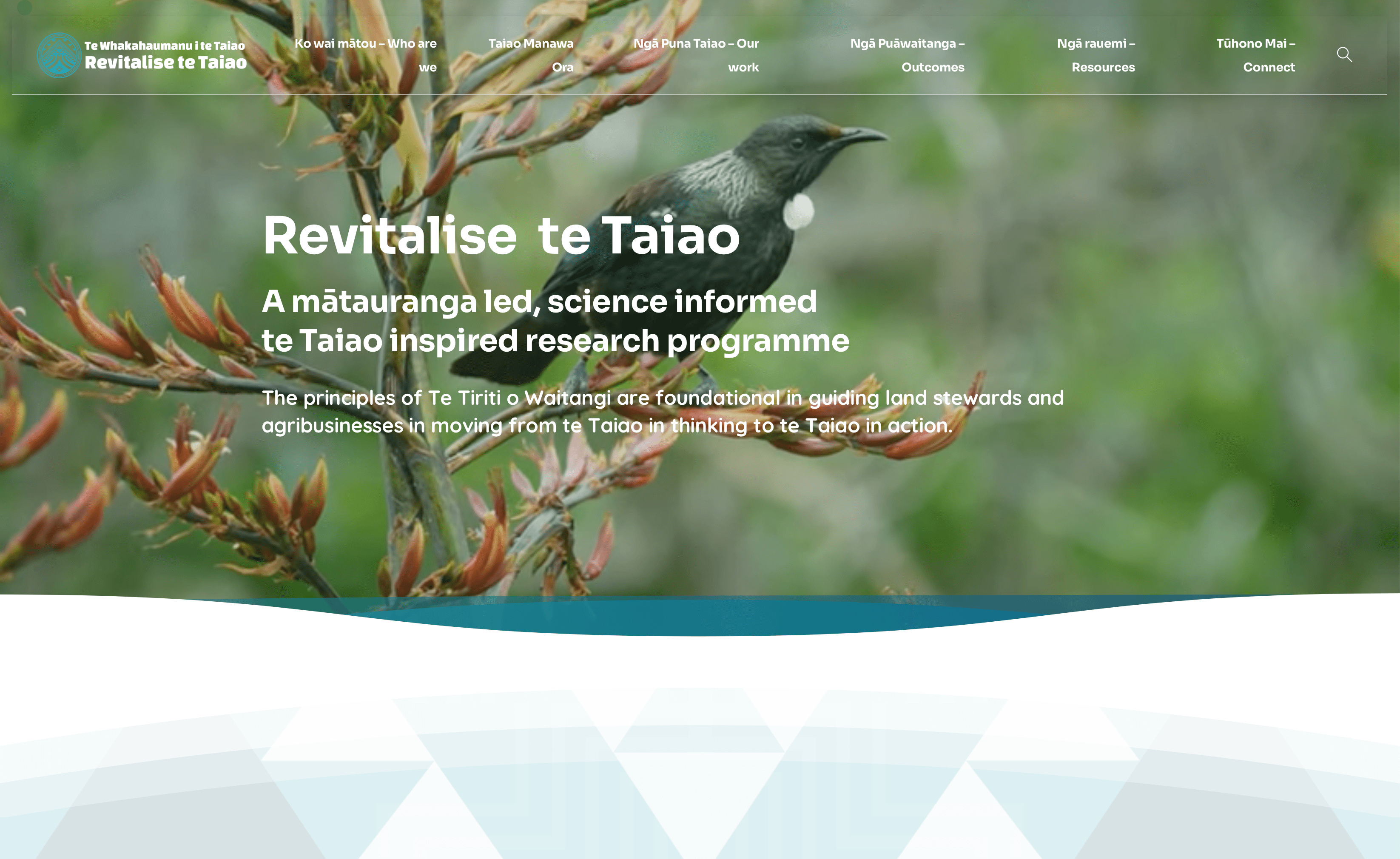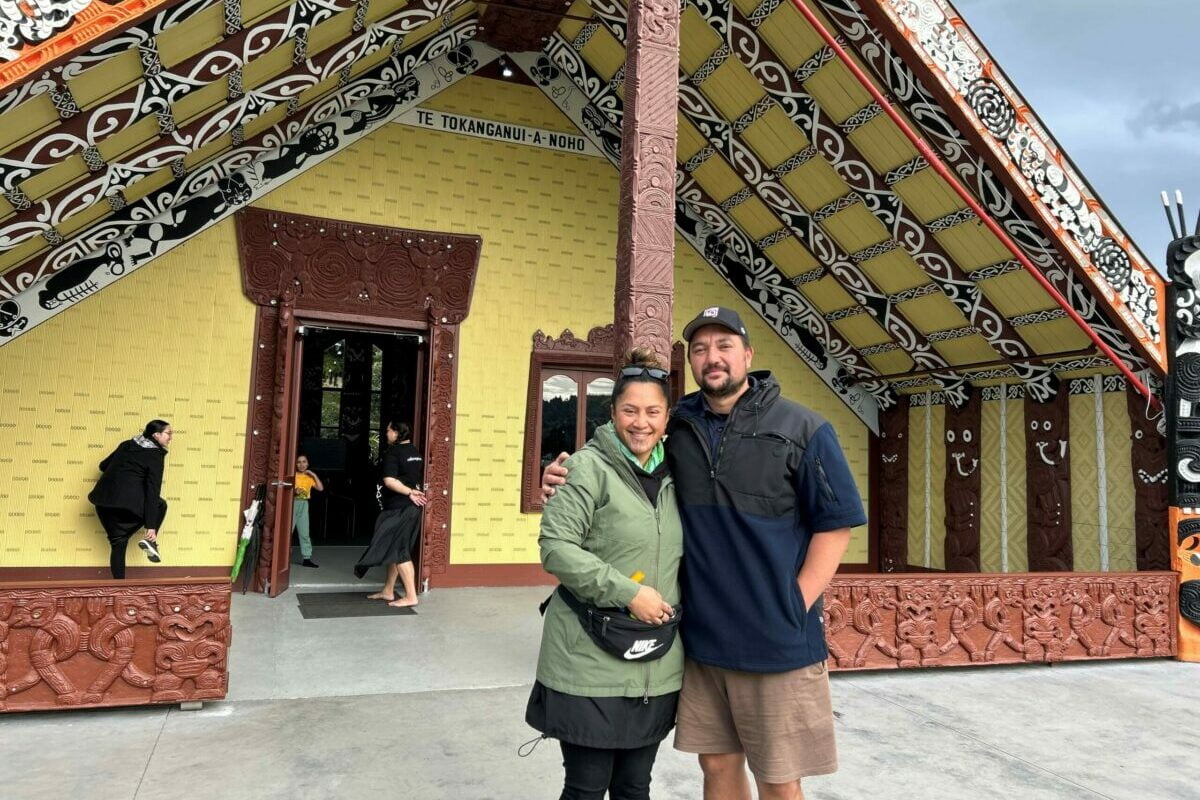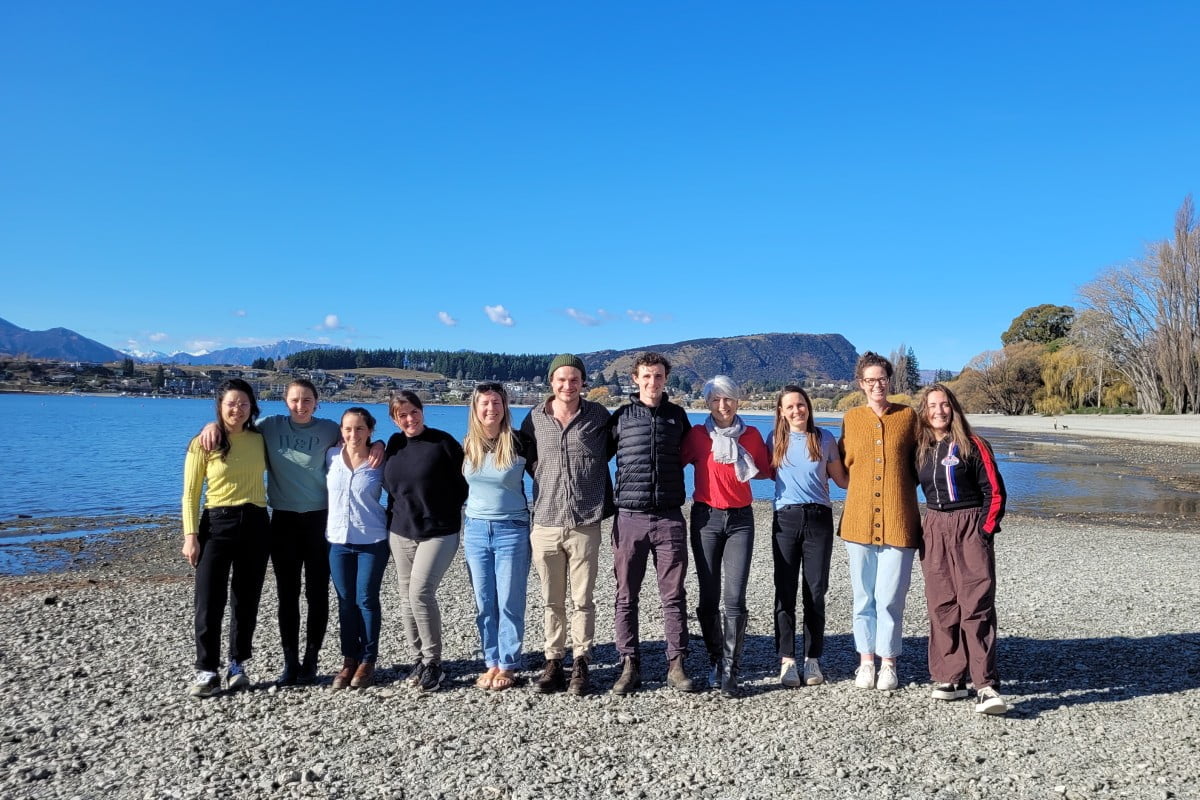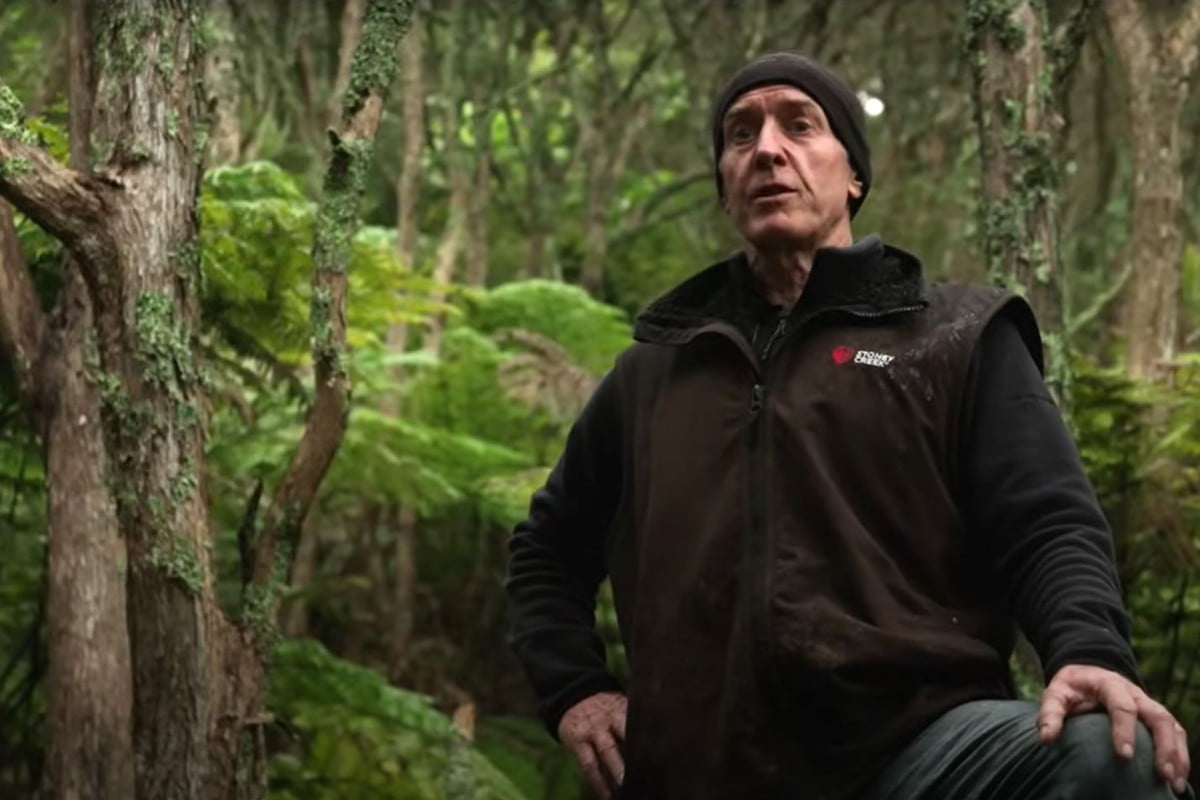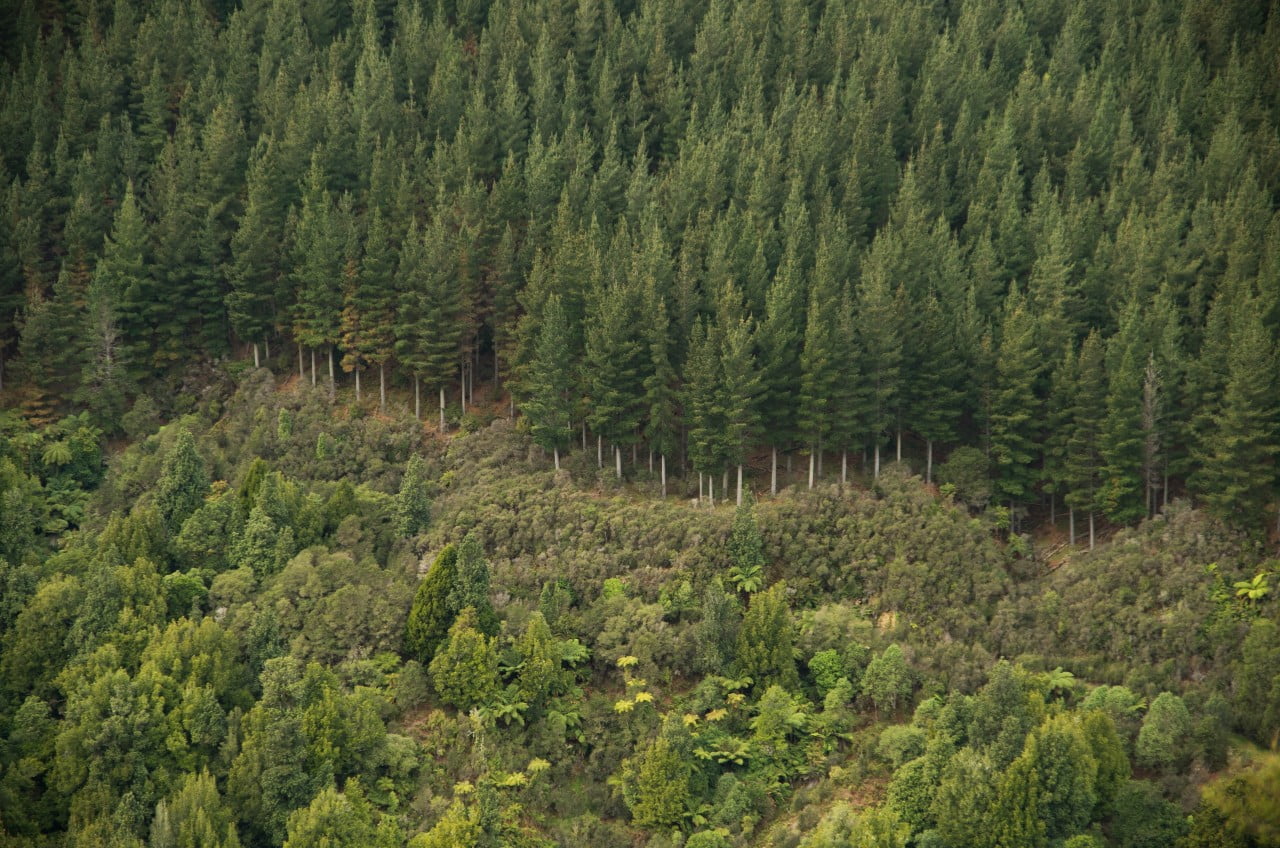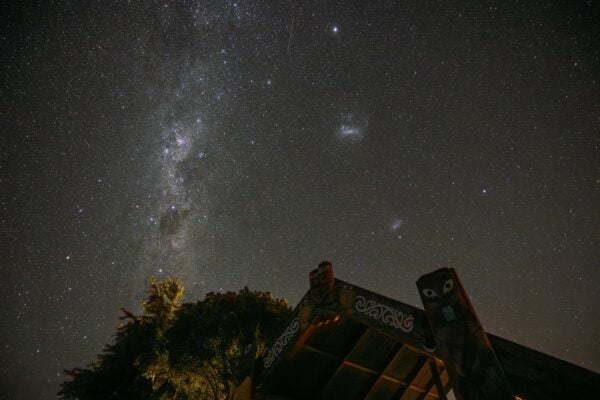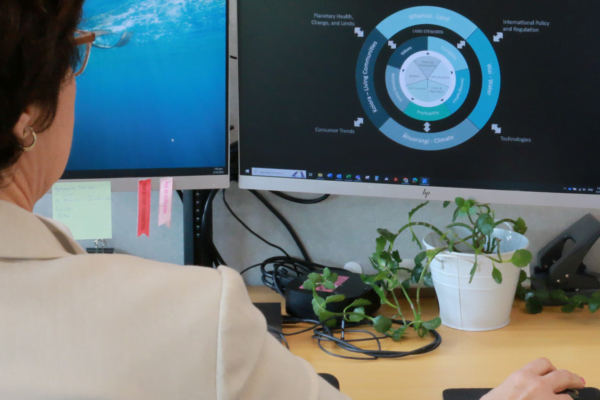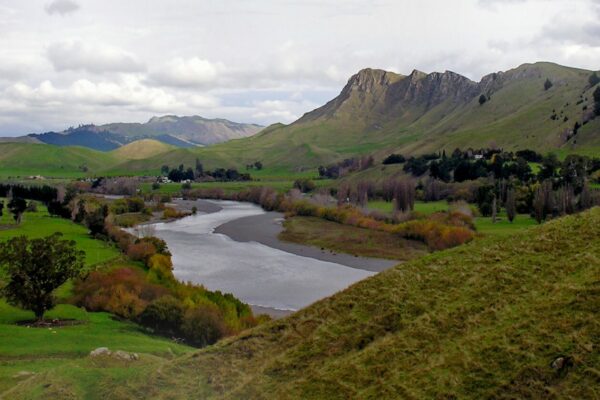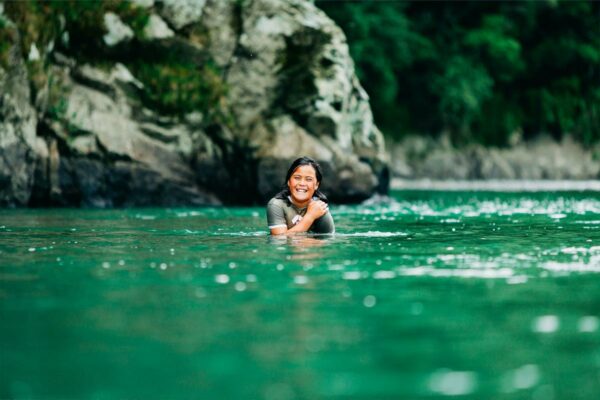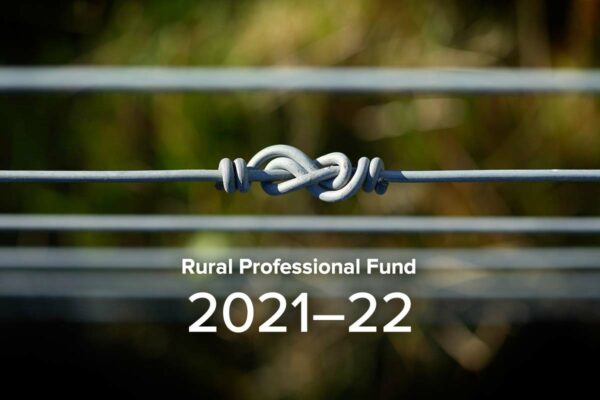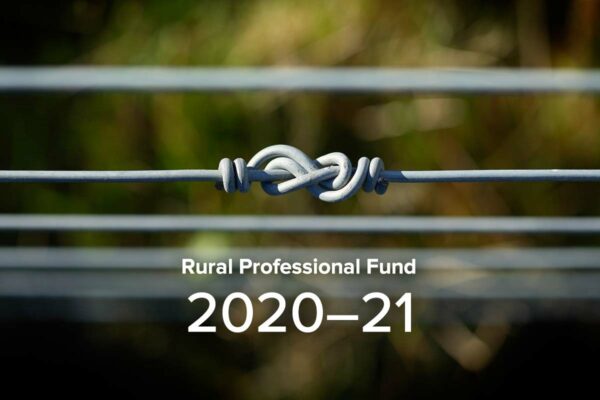Revitalise Te Taiao
Te Whakahaumanu i Te Taiao
Place-based research to develop evidence-based examples of how agribusinesses and communities can make enduring changes in land use, management, value chains, and market focus to revitalise te Taiao.
For full information see the programme website
Project Details Ngā taipitopito
Collaborators Ngā haumi
AgResearch | AgriSea NZ Seaweed | Heather Collins Consulting | Kia Ora Media Marketing & PR | Mārama | Ngāti Tāwhirikura Hapū Trust | Paemi Ltd | Pahemata Ltd | Rautāpatu Ltd | Simon Stokes Consulting | WAI Wānaka
What are we doing? E aha ana mātou?
E ngā mana, e ngā reo, nau mai piki mai kake mai ra ki te waka Taiao e toia nei ngā ohāki kia toitū te whenua, kia toiora te wai. Ko ngā tikanga o te Tiriti o Waitangi e paihere i te kaupapa whakarauora Taiao, kia eke panuku, kia eke tangaroa, te kaupapa rangahau o Revitalise te Taiao. Whai oranga mauri ora.
Food producers all over the world are facing connected challenges: the health of soil and water, climate change, and changing customer expectations. We can respond to these challenges in a uniquely Aotearoa way by implementing Te Tiriti o Waitangi principles in all efforts to help revitalise te Taiao – the land, water, climate, and biodiversity that contains and surrounds us all.
This research has pilots in three locations, working alongside agribusinesses and communities as they progress land-use change, work with value chains and connect with markets to revitalise te Taiao.
- Wānaka-based project Knowledge into Action for Te Taiao, led by WAI Wānaka, has research goals that include expanding traditional farm plans beyond tools of regulation, to enhance the vitality of te Taiao.
- Taranaki-based Te Kāhui Rau, led by Ngāti Tāwhirikura, aims to revitalise hapū whenua and whānau.
- Based in the Bay of Plenty and Waikato, Rere ki Uta, Rere ki Tai is testing farming methods that aim to enhance the mana and mauri of the soil across 10 dairy farms, led by AgriSea New Zealand.
Agribusiness entrepreneurs and innovators will work side-by-side with scientists to revitalise te Taiao. Respecting that all knowledge starts as local knowledge, solutions will be tailored to fit the local context of production, economy, community, and environment.
Te Tiriti o Waitangi principles of partnership, participation and protection are central to this research.
For full information see the programme website.
E aha ana mātou?
E ngā mana, e ngā reo, nau mai, piki mai, kake mai rā ki te waka Taiao e tōia nei ngā ōhākī kia toitū te whenua, kia toiora te wai. Ko ngā tikanga o te Tiriti o Waitangi e paihere i te kaupapa whakarauora Taiao, kia eke panuku, kia eke tangaroa, te kaupapa rangahau o Revitalise te Taiao. Whai oranga, mauri ora.
Kei mua i te aroaro o ngā kaiwhakaputa kai huri noa i te ao ngā wero e honohono ana tētahi i tētahi: arā, te hauora o te oneone, o te wai, te panoni āhuarangi, me te huringa o ngā kawatau a ngā kiritaki. Ka taea e tātou te urupare ki ēnei wero i runga i te āhua ahurei nō Aotearoa tonu mā te whakatinana i ngā mātāpono o Te Tiriti o Waitangi ki ngā mahi katoa hei āwhina ki te whakahaumanu i te Taiao – arā, i te whenua, i te wai, i te āhuarangi, i te kanorau koiora, e noho ana tātou ki roto i a ia, e karapoti ana ia i a tātou anō hoki.
Kei tēnei rangahau ngā whakamātau kei ngā wāhi e toru, e mahi ana ki te taha o ngā pakihi ahuwhenua, o ngā hapori hoki i tā rātou koke whakamua i te huringa whakamahinga-whenua, i tā rātou mahi ki ngā meka uara, i tā rātou tūhono ki ngā mākete hei whakahaumanu i te Taiao hoki.
- Kei te kaupapa i Wānaka, arā kei Knowledge into Action for Te Taiao, e ārahina ana e WAI Wānaka ngā whāinga rangahau i roto rā ko te whakawhānui i ngā mahere pāmu tūturu ki tua atu i ngā taputapu o te waeture, hei whakapiki ake i te hau o te Taiao.
- E whai ana a Te Kāhui Rau, i Taranaki, e ārahina ana e ngā uri o Ngāti Tāwhirikura, ki te whakahaumanu i te whenua nō te hapū, i ngā whānau hoki.
- Kei Te Moana-a-Toi, kei Waikato hoki a Rere ki Uta, Rere ki Tai, e whakamātau ana i ngā tikanga mahi pāmu e whai ana kia whakapiki i te mana, i te mauri hoki o te oneone puta noa i ngā pāmu miraka kau 10, e ārahina ana e AgriSea New Zealand.
Ka mahi ngā rakahinonga me ngā kaiauaha ki te taha o ngā kaipūtaiao hei whakahaumanu i te Taiao. I runga i te whakaute i te whakaaro nei ka tīmata ai te mātauranga katoa hei mātauranga nō tētahi wāhi, ka āta hangaia ngā otinga kia pai ai ki te horopaki pātata o te whakaputanga, o te ōhanga, o te hapori, o te taiao anō hoki.
Kei te iho o tēnei rangahau ngā mātāpono o te Tiriti o Waitangi o te houruatanga, o te whai wāhitanga, o te matapopore hoki.
How can the research be used?Ka pēhea e whai take ai te rangahau?
- Inspiring and practical examples of communities and agribusinesses moving along the pathway to revitalise te Taiao will be highlighted. The research will provide evidence to guide actions to enable other communities and agribusinesses to take a similar journey.
- Agribusiness entrepreneurs and innovators will work side-by-side with scientists to progress te Taiao pathways, understand these journeys, and create change beyond the programme.
- This programme aims to understand what land use, management, value chain and market opportunities can be identified if agribusinesses and communities begin with te Taiao. The work of the three pilots will be connected with value chains that are willing to put te Taiao at the centre, to explore whether this resonates with consumers and enables producers to gain a premium for their products.
- The research team will develop principles for land-use change that enable agribusinesses, mana whenua, farmers, growers, and communities to take collective responsibility for revitalising te Taiao. External conditions that are needed to achieve widespread and significant change will also be identified.
- The research will produce evidence of how specific markets respond to te Taiao narratives based on connection to people, place, and indigenous knowledge.
- The research team will gather data from interviews, surveys, observation, and participation to understand the values, beliefs, and practices that underpin collective understanding, motivation, and action to revitalise te Taiao.
Ka pēhea e whai take ai te rangahau?
- Ka miramirahia ngā tauira whakahihiko, ā-tinana hoki o te ahunga atu o ngā hapori me ngā pakihi ahuwhenua ki te ara hei whakahaumanu i te Taiao. Ka tukuna e te rangahau te taunakitanga hei ārahi i ngā mahi ki te whakaahei i ētahi atu hapori, i ētahi atu pakihi ahuwhenua hoki kia whāia ai te ara ōrite.
- Ka mahi ngā rakahinonga me ngā kaiauaha ki te taha o ngā kaipūtaiao ki te koke whakamua i ngā ara o te Taiao, ki te mārama ki aua haerenga, ki te whakarite i te huringa kei tua atu i te hōtaka.
- E whai ana tēnei hōtaka kia mārama ki ngā āheinga o te whakamahinga whenua, o te whakahaerenga, o te meka uara, o te mākete hoki ka taea te tautuhi mēnā ka tīmata ngā pakihi ahuwhenua me ngā hapori ki te Taiao. Ka tūhonoa te mahi o ngā whakamātau e toru ki ngā meka uara e pai ana ki a rātou te whakatū i te Taiao ki te pokapū, hei torotoro atu mēnā rānei ka reretahi tēnei ki ngā kiritaki me te whakaahei i ngā kaiwhakaputa kia whiwhi i te utu tāpiri mō ā rātou hua.
- Ka whakawhanake te rōpū rangahau i ngā mātāpono mō te huringa whakamahinga-whenua e whakaahei ai i ngā pakihi ahuwhenua, i ngā mana whenua, i ngā kaipāmu, i ngā kaiwhakatipu, i ngā hapori hoki kia tū ngātahi hei haepapa i te whakahaumanu i te Taiao. Ka tautuhia hoki ngā āhuatanga rāwaho e hiahiatia ana hei whakatutuki i te huringa e horapa whānui ana, e hira ana hoki.
- Ka whakaputaina e te rangahau te taunakitanga mō te urupare a ētahi mākete ake ki ngā tāhū o te Taiao i runga i te hononga ki te tangata, ki te wāhi, ki te mātauranga taketake hoki.
- Ka whakaemi te rōpū rangahau i te raraunga mai i ngā uiui, i ngā tirohanga, i te mātakitaki, i te whai wāhitanga hoki hei mārama ki ngā uara, ki ngā whakapono, ki ngā tikanga mahi e noho ana hei pūtake o te māramatanga ngātahi, o te whakahihikotanga ngātahi, o te mahi ngātahi hei whakahaumanu i te Taiao.
Related research updates Ngā pānui mō te rangahau nei
Participation & engagement Te hunga i whai wāhi mai
- The motivation for change starts with ‘sense of place’, where people feel they belong. For Māori, farmers, growers, and community members, connections and whakapapa back to the whenua are interlinked with identity, health, and wellbeing. Partners in each of the three regional pilots include mana whenua, farmers and growers, agribusiness innovators and entrepreneurs, and researchers.
- Te Tiriti o Waitangi principles of partnership, participation and protection are guiding the implementation of the Revitalise Te Taiao research internally and with the three pilots (Ngā Kaiurungi Taiao), which include tangata whenua and tangata Tiriti.
- The research embraces diversity of knowledge and ways of knowing within different worldviews. Revitalise Te Taiao is mātauranga-led, science-informed, te Taiao-inspired research. We respectfully incorporate te reo Māori me ona tikanga values in how we communicate and engage.
- This research was established under terms that prioritised inclusion in the three pilots of Māori agribusiness and land management. Revitalise Te Taiao was co-designed and co-developed by 25 individuals from across Māori agribusiness, mātauranga Māori practitioners, scientists, researchers, community leaders, government and industry representatives.
- Participants from Māori business and community members have a diverse range of skills and experience, including kaupapa Māori, Māori-centered and Māori-led initiatives and research; and mātauranga Māori with respect to land and freshwater-based sustainable business.
 View Our Strategy Document 2019 – 2024
View Our Strategy Document 2019 – 2024



